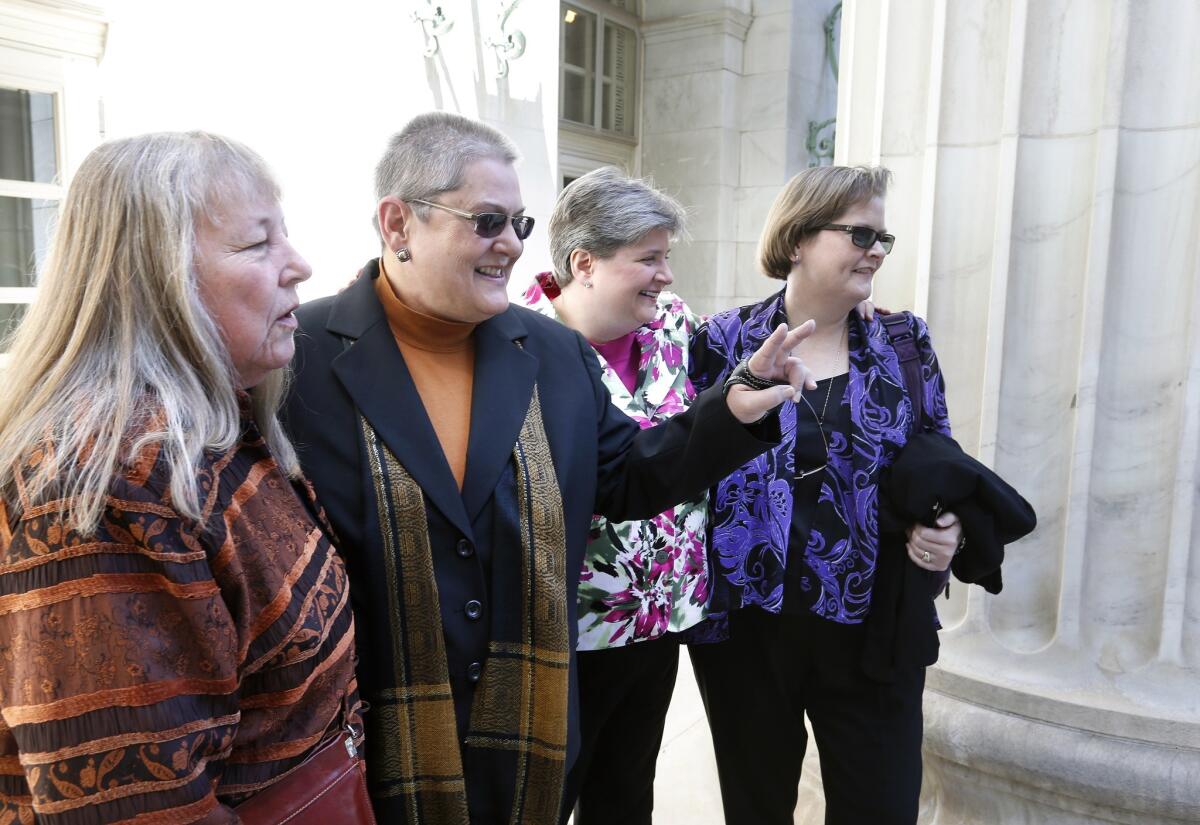Denver-based appeals court again takes on same-sex marriage

- Share via
For the second time in about a week, a federal appeals court in Denver wrestled Thursday with the question of same-sex marriage, this time in a case from Oklahoma. Last week, the same group of judges heard an appeal on a similar case from Utah.
Though the cases are separate, the issue the court is being asked to decide is essentially the same in each. Both cases revolve around lower federal court rulings that struck down state same-sex marriage bans approved by voters. The cases pit the constitutional rights of individuals to marry against the states’ view of what voters want.
The Denver-based 10th Circuit Court of Appeals is expected to hand down separate rulings in the cases, but the issue of same-sex marriage is likely to head to the U.S. Supreme Court, which touched off the current round of legal fighting when it struck down parts of the federal Defense of Marriage Act last year.
In essence, the high court ruled that same-sex marriage must be treated the same way as heterosexual marriage where federal laws are concerned, though it stopped short of legalizing gay marriages.
In December, a federal judge struck down Utah’s ban on same-sex marriage, a ban approved by about 66% of voters in 2004. More than 1,000 same-sex couples married before the U.S. Supreme Court issued a stay on the ruling in January.
Then in January, U.S. District Judge Terence Kern of Tulsa issued a similar ruling using the same reasoning that a state ban on same-sex marriage violates the U.S. Constitution’s equal-protection clause. Oklahoma’s ban was approved by 76% of the voters, also in 2004.
The day after Oklahoma voters made their decision, Mary Bishop and Sharon Baldwin filed a lawsuit against the state ban. They have been fighting ever since.
“Ours is the longest-running marriage equality case in the country,” Baldwin told the Denver Post on Thursday morning. The other plaintiffs are Susan Barton and Gay Phillips.
In a Wednesday post on the blog Freedom to Marry, an advocacy group for same-sex marriage, Baldwin reflected on last week’s oral arguments in the Utah case, which also raised questions about the state’s right to regulate marriage and the role of children.
“I think we were struck by how, frankly, it’s the same old arguments they’ve been using all along that have been so unsuccessful,” she said.
“They make it sound as though there are a limited number of marriage licenses and if they start handing out marriage licenses willy-nilly to same-sex couples who can’t have a child, then what is that going to do to procreation? Well, it’s not going to do anything to procreation. People who still want to have children will still have children.”
The three-judge panel that heard the Oklahoma case Thursday comprised the same judges who heard Utah’s appeal last Thursday. Based on their questions, they appear to be split, asking attorneys about whether the state can ban gay marriages and about the discrimination issue.
U.S. Circuit Judge Jerome A. Holmes, an appointee of President George W. Bush, is considered the likely swing vote, and he asked whether Utah’s same-sex marriage ban was similar to Virginia’s former ban on interracial marriage. That ban was struck down by the U.S. Supreme Court almost five decades ago.
A federal court recently cited that argument to allow same-sex marriages in Virginia. That case is also being appealed.
More to Read
Sign up for Essential California
The most important California stories and recommendations in your inbox every morning.
You may occasionally receive promotional content from the Los Angeles Times.














